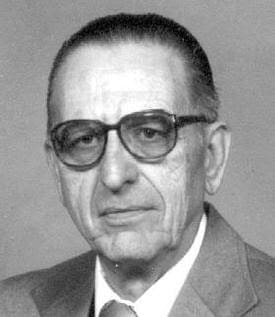Marvin VanGilder was an editor with The Carthage Press from the 1950s until the 1970s and a writer and columnist for The Press from the 1980s until his death on July 11, 2010. VanGilder was also a community leader, teacher, pastor, musician and was involved in the creation of the Maple Leaf Festival, The Battle of Carthage State Historic Site and other notable achievements. He was a prolific author almost until his death, leaving a wealth of columns, historic research, radio programs that can still be heard on radio station KDMO, and several books on Jasper County history and the histories of some of the communities in Jasper and Barton counties.
The Carthage Press is rerunning some of VanGilder’s writings provided to us by his family. The Carthage Press wants to thank the VanGilder family for providing these writings and allowing his works to live on through our new “The Carthage Press.”
Originally published January 4, 1969
Terminate Gossip …
We hope New Year’s resolutions adopted by many people include something like: I will not listen to malicious gossip and I will not repeat it.
Gossip founded upon incomplete or non-existent information, often stemming from more than a desire to gain fiendish delight from the misfortunes of others, is one of the most destructive practices in which human beings can engage.
Lives have been destroyed by it; this makes it as bad as murder. Public enterprises have been ruined by it; this makes it as bad as thievery. Hate has been generated and spread by it; this makes it as bad as any contagious disease.
Newsman spend a large portion of their time tracking down unfounded gossip. Our investigations usually lead us back to the source and that source in a surprising number of cases is someone who ought to know better.
The arrival of a new year, a time for fresh beginnings, is a good time to agree to terminate this ugly and despicable practice.
Killing Emotion …
“Driving under the influence of emotion can be fatal,” according to a life insurance firm which last year completed a survey of the effect of emotional problems up the techniques of motorists.
The survey quotes authorities who estimate up to 80 per cent of traffic accidents are caused by the emotional conditions of the drivers.
Some people even commit suicide with their cars, says J. Stannard Bake of the Traffic Institute of Northwestern University who wrote the first textbook on traffic accident investigation and has investigated thousands of fatal mishaps.
He estimates five per cent of traffic fatalities are suicides or victims of suicide drivers. The same estimate was made independently by Dr. Robert Litman of the Low Angels Suicide Prevention Center.
A driver’s emotions – anger, depression, fear, elation – may impair his perception and delay his reactions. He may look directly at a stop light and drive through it or fail to see another vehicle merging with his traffic lane. Emotion sometimes acts like a drug, inhibiting the brain’s decision-making and risk-taking process.
Several agencies now are conducting extensive studies in an attempt to find some means of combating this most serious of highway hazards – uncontrolled emotion.
In the meantime, every concerned driver should be alert to the danger involved when this own emotions are beyond control and avoid driving while under the influence – of emotion.
Another step to be taken is a matter of self-defense; drive defensively all the time; you never know when the person behind the wheel of the approaching vehicle is bent on suicide or is lost in the midst of raging argument with his spouse.
Not Psychic …
“Why didn’t you have something in the paper last month about my Aunt Mary coming to Carthage for a visit? It was the first time she’d been here since she graduated 40 years ago from Carthage high school and that certainly is news. She’s the social leader of Podunk and sure is worth more space than that item you ran the other day about the couple visiting from St. Louis.”
This is a typical complaint, one which The Press and most other newspapers receive each day.
The answer is simple enough. We didn’t report about Aunt Mary’s visit because we didn’t know it. We’re not psychic. We try to be everywhere at once and in constant contact with everyone. But this is not humanly possible.
There are many bits of choice news which we cannot know unless the participants tell us.
News space always is available in The Press for the activities of every person and every family in the district. It’s as close as the telephone: 417-731-3158.















